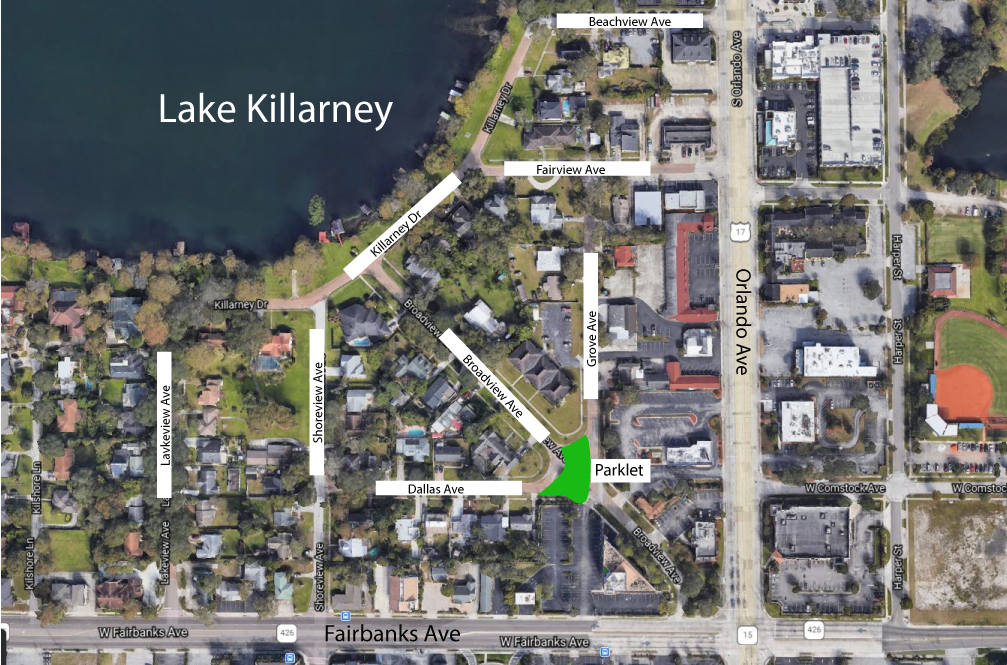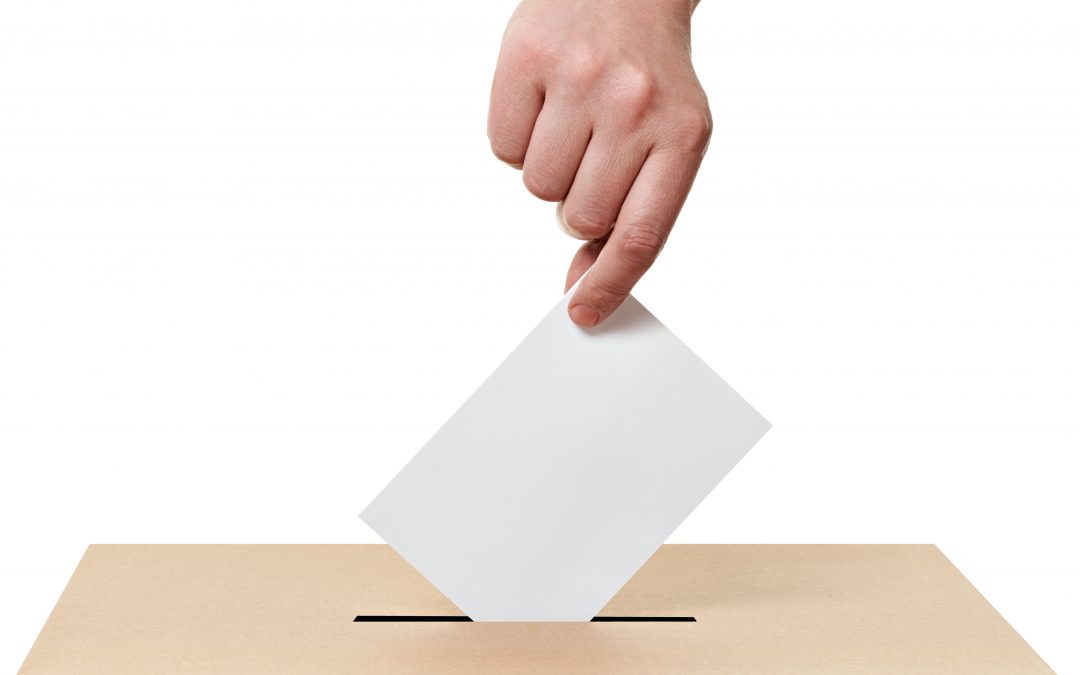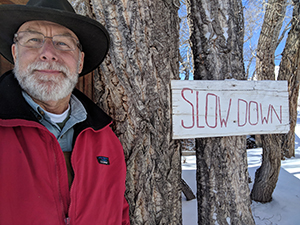
by Anne Mooney | Mar 30, 2021 | News, Zoning and Development
Killarney Estates – No Longer the ‘Forgotten Triangle’
Can the City Reunite the Neighborhood?
In late January, plans to build the Henderson Hotel in the triangle bordered by 17-92, Fairbanks Avenue and Lake Killarney, known as Killarney Estates, ran headlong up against Comprehensive Plan Policy 1-J-9, which reads, “Protect Single-Family Residential Use in the Killarney Neighborhood from Non-Residential Land Use Encroachment. The City shall preserve and protect the single-family residential land use within the Killarney neighborhood from commercial and office encroachment . . . .”
Just before midnight on January 27 — before the Commission could vote on Commissioner Marty Sullivan’s motion to deny – attorney for developer Adam Wonus withdrew the application to build the hotel. It was Game Over.
Killarney Neighborhood’s cut-through traffic
Despite the outcome for the Henderson, Adam Wonus’s two-year effort to win approval for his project produced some positive results for this neglected corner of Winter Park by shining a light on serious traffic problems and general infrastructure neglect by the City. For years, Killarney residents had been plagued by cut-through traffic trying to avoid the major intersection of 17-92 and Fairbanks Avenue, and the development of way-finding apps has only made matters worse as Waze and others direct drivers going from 17-92 to Fairbanks (or the reverse) through the back streets of the neighborhood.
City Planners to the rescue
When Adam Wonus began meeting with the Lake Killarney neighbors about his proposed hotel, they described their traffic woes and Wonus alerted City Planners to their need for help. Commissioners and City staff met with the neighbors and decided to field test a traffic barrier on the southern leg of the intersection of Killarney Dr. and Fairview Ave. The City also created a permanent physical separation of Grove Ave. from Dallas Ave. and Broadview Ave. Adam Wonus even paid for the planter bollards that formed the barrier at Killarney Drive and Fairview Ave.
The traffic calming measures worked, cut-through traffic has slowed to a trickle and most Killarney neighbors are living happily ever after.
Unintended Consequences – A Neighborhood Divided
The demise of the Henderson project, however, has left what would have been the commercial hotel property separated from the rest of the neighborhood. The successful measures to tame cut-through traffic in the residential area southwest of Fairview now separate that part of the neighborhood from the portion north and east of Fairview.
The northeast part of the neighborhood is a mix of residential, commercial and office, and part of it fronts on 17-92, but there are still residential lakefront parcels in that area which most of the Killarney neighbors and the all of the City Commission wish to protect from commercial development.
How to put the neighborhood back together?
At a special Commission meeting February 11, 2021, the Commission directed staff to come up with additional options to protect the residential lakefront property and to reintegrate those properties into the existing transportation network. City staff also has initiated negotiations with mapping companies to eliminate cut-through routes through the Killarney neighborhood.
Decisions on traffic solutions must be based on future land use
At the March 24 Commission meeting, Planning Department staff presented 12 possible solutions to the remaining traffic problems.
Commissioner Carolyn Cooper quickly pointed out how the cart may have gotten ahead of the horse. “There are very different possible traffic solutions, depending on what the land use is,” she said. “Before we talk about zoning, let’s talk about what future land use really makes sense on these five or six parcels. The traffic solution must be based on a resolution of future land use by this Commission.”
Commission agrees to future workshop to discuss future land use
Of the possible solutions to the traffic problems, the City’s first option describes measures that either are already in place or well into the planning stages. It includes the planter bollard barrier at Fairview and Killarney Dr., and a small park area that would cut off the connection between Broadview, Dallas and Grove Avenues. This area already has been cordoned off with temporary barriers and cones. The only thing missing was a funding source. To build the “parklet,” as it is called, the City had to find $165,000 in additional funds.
CRA or Parks Acquisition Fund?
Since the intersection of Broadview, Dallas and Grove falls within the CRA, money could come from CRA, or because it’s a ‘parklet,’ the money could come from the Parks Acquisition Fund.
Commissioner Sheila DeCiccio made a motion to move forward with this option, to leave the bollards as they are, build the ‘parklet’ with $165,000 from the Parks Acquisition Fund and to hold a workshop to discuss future land use and a more permanent traffic solution based on the future land use. Commissioner Todd Weaver seconded. Weaver amended the motion to add approximately $3,600 to reimburse Adam Wonus for the cost of the bollards, with a second from Commissioner Marty Sullivan.
The main motion, as amended, passed on a 5-0 vote.
To comment or read comments from others, click here →

by Anne Mooney | Mar 17, 2021 | Election
Election Recap 2021
How Winter Parkers Saw the March 9 Election
by Anne Mooney / March 17, 2021
In an effort to make sense of the recent mayoral election, I polled a group of WP Voice readers – chosen because of their frequent activity on the Facebook group and their differing points of view – and asked them the following ten questions. A little over half the readers I approached responded, and to them, I am grateful.
Here are the questions and the substance of the responses. I agreed not to attribute any answer to any particular respondent.
- What single issue do you believe most strongly influenced this election?
All respondents cited future development as the most important issue. Since what the Commission does is primarily land use, a candidate’s vision of what the city should look like and how it should grow is always central. While there seemed to be a clear difference between the two candidates’ approaches to growth and development, the reality is that despite what they say they will do, the Mayor has just one of five votes.
In this race, the question of how the City will develop centered on the Library and the Orange Avenue Overlay. This respondent spoke for the rest when s/he wrote, “I think the OAO properly refined by P&Z and the Commission would not have been as hot an issue except that it came on the heels of the Library-Events Center. I have never seen so many people angry at how that project was handled from the start, people who were in favor of the Library are upset, and I think that dictated the way the last two Commission races went; and even as deep as her roots are in WP, I think that Library sealed Sprinkel’s fate.”
- Was there an issue that was not addressed that you believe should have been?
While about half the respondents said simply, “No,” the other half brought up the issues of ethics and accountability. “What is the score card by which voters can hold you accountable?” wrote one.
- What issue would you ask Phil Anderson to address in his first 100 days?
As you’d expect, this one garnered a variety of topics. Respondents wanted Anderson to bring the Commission together and set strategy for the next two to three years. Demonstrate that he’s going to respect and abide by the Comprehensive Plan. Pursue efforts to acquire the Post Office property, and assess the City Manager’s efforts to assist in this process and, in general, evaluate the City Manager’s service to the City.
Several urged that Commission meetings be reorganized to reduce or eliminate marathon meetings and to create greater opportunity for working people to participate. Nearly everyone wanted Anderson to bring clarity and direction to the Orange Avenue Overlay process. “I have seen lots of good ideas,” wrote one, “but we ought not let that area languish.”
Respondents saw a need to gain firmer control of decisions and approval on the library-events center, and to clarify the relationship between the City and the Library Board of Trustees. One wrote: “The fact that a non-elected, self-perpetuating Board, with only token representation from the City [one Commissioner sits on the Library Board] has so much authority over a major asset of the City is a strange arrangement. Before signing a lease with this entity, the Commission should have taken time to examine that relationship. The Library Board should have members appointed, as do other Boards, by the Mayor and Commissioners, and the City should reserve final authority on any major decisions.”
- Was there a campaign video, flyer, website page or other campaign collateral piece that stood out to you? (Or that you even remember?)
Most said they tossed the collateral material and thought it was a waste of money. Those who took the time to read the mailers tended to remember the negatives. One was disheartened to see a mailer that painted Anderson as “anti-woman,” calling it a “low blow.”
One respondent pointed out that the timing of the Events Center video “preview,” which featured Sarah Sprinkel prominently and had Mayor Steve Leary assuring us the project is on time and on budget, was probably not coincidental. Several respondents remembered (negatively) the “Important Tax Information” letter endorsing Sprinkel that was signed by Ken Bradley and Mike Miller.
There was a definite bias in favor of digital media, with social media and campaign website videos of both Sprinkel and Anderson viewed as more genuinely informative and less cumbersome than the collaterals that came on paper.
- Was there a slogan or catch phrase from either campaign that resonated with you?
Resounding “thud” here – all respondents except one answered No. The sole respondent who recalled a campaign slogan was clearly an Anderson supporter.
- How did you feel about the debates? Did they help you decide which candidate to support? Were there too many or too few, or just right?
The most interesting responses here were the ones that preferred the Sentinel video interviews with the two candidates to any of the debates. They found the Sentinel videos more informative and interesting.
All respondents agreed there should be public forums where the candidates share and contrast their views. The Library debate got high marks, and no one said there were too many opportunities to see the candidates square off in front of an audience. Respondents were united in their belief that the Chamber of Commerce debate would be improved by having a neutral moderator curating the questions.
- In hindsight, how do you think that ‘wild card’ question from the Chamber of Commerce should have been handled?
Respondents were unanimous in their opinion that the question as written should never have been asked. ‘Biased,’ ‘loaded,’ ‘inappropriate’ and ‘disgraceful,’ ‘offensive’ and ‘ham-handed’ were among the adjectives used.
One respondent wrote, “I thought both candidates fielded the question in equally good ways. Sarah shook her head and then went to the substance, which was fine. Phil directly addressed the problem with the question, which was also fine.”
Another respondent, who did not see the debate but who heard about the question, was a bit more pointed: “This moderator apparently prefaced a question submitted by someone with this charge of Sunshine Law violations . . . . If he was put up to it, it is vile, and if this guy did it on his own, either the President or the Chair of the Chamber should have immediately risen and made it clear to all that that statement was out of bounds and had no place at that debate.”
- For an ‘off year,’ a 34 percent turnout is quite high. Of the nearly 8,000 people who voted, however, nearly 3,000 waited until election day rather than voting by mail. Why do you think so many waited?
Most respondents thought people were happy to have an excuse to get out of the house. There was no early voting site in Winter Park, and Winter Park is a pretty traditional town where voters like to go to the polls on election day.
Several respondents expressed the opinion that 34 percent was a poor showing, but when compared with 15 percent for Ocoee, 19 percent for Windermere and 13 percent for Winter Garden, Winter Park is looking pretty good.
- Was there anything about the election that surprised you?
There are some good quotes here – let them speak for themselves.
“Neither candidate stooped to the level of bringing up dead relatives.”
“Phil Anderson won without any negative campaigning.”
“The audacity of the notion of putting residents first at City Hall was exactly what was needed.”
“The Commission should take note that the trend over the last few election cycles demonstrates that the residents want smaller scale, slower growth.”
“Keep your message positive and stick to the issues. Even mud slung by surrogates of the candidate tends to bounce back and sully the candidate her/himself.”
Many thanks to Lisa Coney, Bill Segal, Sandy Womble, Chele Hipp, Jack Miles, Jan Hommel, Doug Bond and Beth Hall, who gave the Voice permission to use their names. Thanks also go to additional respondents who did not wish to be identified. The care and thought that went into all of the responses speaks volumes. It is very clear that these people, our neighbors, are committed to our City and care deeply about our community.
To comment or read comments from others, click here →

by Anne Mooney | Feb 12, 2021 | Election
‘Blatant Collusion’ Question Frays City-Chamber Relationship
by Anne Mooney / February 12, 2021
The Commission met Feb. 11 to discuss the deteriorating relationship between the City of Winter Park and the Winter Park Chamber of Commerce. The special meeting was necessary because a public meeting is the only way Commissioners can speak with one another to air opinions and exchange views.
At issue was a question posed at the Chamber-sponsored Feb. 5 debate between mayoral candidates that accused Commissioners of “blatant collusion” on a vote on the Henderson Hotel project, a vote that never took place.
Loaded Question
The debate question in its entirety reads as follows.
“It was dismaying to see the members of the city commission blatantly colluding to spike the Henderson project, which was approved by P&Z [Planning & Zoning] and was supported by the residents of Winter Park three to one over those opposing the project. As mayor, how would you ensure the commission enacts the wishes of the majority of WP residents, not just the agenda of an entitled few?”
Anderson campaign & Chamber issue joint statement
After a tense exchange between Chamber President Betsy Gardner Eckbert and mayoral candidate former Commissioner Phil Anderson about the propriety of the question, the Anderson campaign and the Chamber issued a joint statement that the two parties had “come to terms with the matter and look forward to placing it behind us in an effort to bring our community together.”
While that might have taken care of the issue for the Chamber and the Anderson campaign, the question was still circulating digitally through the community and the integrity of the sitting Commissioners continued to be impugned.
Commissioners want an apology
Commissioners Todd Weaver, Marty Sullivan and Sheila DeCiccio met in person Thursday afternoon to discuss the matter. Commissioner Carolyn Cooper participated remotely by phone later in the meeting. Mayor Leary was absent.
Commissioners expressed their desire to mend the rift between the Chamber and the Commission and to find an easier, more productive way to work together, while acknowledging that the missions of the Commission and the Chamber differ in several important respects.
Commission & Chamber Board should meet – soon
Commissioners agreed that a meeting between the Commission and the Chamber Board of Directors to address the issue should be scheduled as soon as possible. Commissioners also made clear an apology for the “blatant collusion” question was in order and would go a long way to calm troubled waters.
Allegations of collusion are defamatory
“That question was reviewed and allowed by the Chamber,” said Commissioner Sheila DeCiccio. “Such spurious and toxic allegations are, at their worst, defamation per se; and at the least, they are highly unprofessional and inappropriate. They have no place in a political debate.”
“Therefore,” DeCiccio continued, “the Chamber is complicit in staging the question, and the Commissioners deserve an apology for the baseless, false implication of collusion. Indeed, the people of Winter Park deserve an apology for having their Commissioners impugned.”
What obligation did Chamber have to vet debate questions?
Representing the Chamber was attorney Derek Bruce, who stated that he had advised Ms. Gardner-Eckbert not to speak and that he would speak on behalf of the Chamber.
‘Secret’ or ‘Brazen’?
Derek Bruce kicked off his remarks by noting that collusion is defined as a ‘secret agreement for fraudulent or unlawful purposes,’ but that the word blatant refers to something that is ‘brazenly obvious.’ He continued round the barn to explain that if a thing is blatant [obvious], it can’t really be collusion [secret]. Mr. Bruce conceded that reasonable people could disagree whether that question was appropriate, but he went on to dismiss it as “just two words in a question,” and not worth all the time and resources being spent on it.
No apology from the Chamber
When DeCiccio’s asked, “Is it your position that the Chamber has no responsibility to offer the Commission an apology for the question?” Bruce stated he had “not been authorized to issue an apology at this time.” When DeCiccio followed up with, “Is it your position that the Chamber has no responsibility to vet the questions in the debate?” Bruce avoided answering the question.
‘Hot Mic’ Moment
At this point, Vice-mayor Carolyn Cooper joined the meeting remotely by phone to object to the way the meeting was going, to the amount of time that had been allotted to Mr. Bruce, and to Mr. Bruce’s refusal to acknowledge that there was anything wrong with the “blatant collusion” question. Cooper, who broke into the conversation with the word ‘stupid’ later clarified that her interjection was intentional.
“Of course there was a problem with it,” said Cooper. “The question as presented accused this Commission of an illegal act. . . . The League of Women Voters has been doing [debates] for years, and they are very diligent about making sure no inappropriate questions are asked. I believe the Chamber has the same responsibility.“
City Attorney supports defamation claim, confirms question is not ‘protected speech’
At Cooper’s request, City Attorney Kurt Ardeman stated that he felt Commissioner DeCiccio’s recitation of the law was correct. “The law is pretty clear,” said Ardeman, “that when a writer publishes a defamatory falsehood with the knowledge that it was false, or with reckless disregard as to whether it was true or false, it is a defamatory statement. Now, you each are elected officials, and the bar is high; however as individuals you are protected against defamatory speech.”
Ardeman advised Commissioners to pursue meeting with the Chamber Board of Directors to reach some resolution and, if possible, to avoid any more back-and-forth between lawyers.
Commissioner Weaver asked Mr. Bruce if the Chamber would take down the debate video that was, at that time, playing on a continuous loop at the Mayflower. Mr. Bruce explained the video had been uploaded to Facebook and he didn’t know if it could be edited or taken down.
As of this writing the debate video is featured prominently on the Chamber website with the disclaimer, “The moderated portion of this forum includes questions from the public, and the views expressed by the public do not reflect the views of the Chamber of Commerce.” The disclaimer makes no promise of impartiality nor does it include an apology.
To comment or read comments from others, click here →

by Anne Mooney | Feb 9, 2021 | News
Special Commission Meeting Called Over Chamber Flap
1:00 p.m. — Thursday, February 11, 2021
by Anne Mooney / February 9, 2021
After cancelling the February 10 regular Commission meeting, because there would not be a three-member quorum physically present, a Special Meeting of the Commission has been scheduled for Thursday, February 11 at 1:00 pm at the WP Community Center at 721 New England Avenue. Virtual meeting attendance is also available by clicking https://cityofwinterpark.org/government/live-broadcasts/
This will be a Special Commission meeting. Commissioners can vote to take action, and public comment will be taken.
The Commission will discuss events from the February 5 debate between mayoral candidates at the Winter Park Chamber of Commerce and whether to take action.
Loaded Question
At issue is the final debate question posed to the candidates, in which Commissioners were accused of collusion:
“It was dismaying to see the members of the city commission blatantly colluding to spike the Henderson project, which was approved by P&Z [Planning & Zoning] and was supported by the residents of Winter Park three to one over those opposing the project. As mayor, how would you ensure the commission enacts the wishes of the majority of WP residents, not just the agenda of an entitled few?”
Mayoral candidate Mayor Phil Anderson expressed his own dismay at the content of the question and stated his objection to the decision to air the question to Chamber President Betsy Gardner Eckbert.
After a brief burst of social media activity, each with its own version of events, the Anderson campaign and the WP Chamber of Commerce Board of Directors issued the following joint statement.
Joint statement issued by WP Chamber and Anderson Campaign
“Following an unfortunate incident at the Winter Park Chamber of Commerce Mayoral Candidate Forum this past Friday, The Chamber and Phil Anderson’s campaign have come to terms with the matter and look forward to placing it behind us in an effort to bring our community together. The Chamber thanks Mr. Anderson and Ms. Sprinkel, the two mayoral candidates, for participating in the Forum.”
To comment or read comments from others, click here →

by Anne Mooney | Feb 2, 2021 | News, Opinion, Zoning and Development
In Answer to ‘A Letter to Winter Park Residents’
Editor's Note: Articles written by citizens reflect their own opinions and not the views of the Winter Park Voice.
Guest Columnist Peter Gottfried / February 2, 2021
 Peter Weldon, a former Commissioner, recently wrote to “fellow Winter Park Residents” outlining his opposition to Phil Anderson’s candidacy for Mayor. Mr. Weldon, as many of you know, ran for City Commission three times. He was elected to one term 2016-2019. He lost in 2008 to Phil Anderson, and again in 2019 to Todd Weaver.
Peter Weldon, a former Commissioner, recently wrote to “fellow Winter Park Residents” outlining his opposition to Phil Anderson’s candidacy for Mayor. Mr. Weldon, as many of you know, ran for City Commission three times. He was elected to one term 2016-2019. He lost in 2008 to Phil Anderson, and again in 2019 to Todd Weaver.
Questionable arguments
In his recent letter, Mr. Weldon seeks to lay what he sees as the current Commission’s shortcomings at Phil Anderson’s door and to question Anderson’s character in the process. These questionable arguments deserve closer examination.
First, Weldon claims, “the actions of Commission members Weaver, Sullivan and DeCiccio bring Phil Anderson’s judgment into question.” If you think about that even for a minute, you’ll realize it’s a bit of a stretch.
Weldon’s assertions
Mr. Weldon wants you to believe that the current Commission . . .
- “Voted to increase the property tax rate 11.5%.”
FALSE: The tax rate (millage) did not change in 2021 and has not changed for 13 years.
- “Voted to “rescind” the Orange Avenue Overlay, changing our Comprehensive Plan in violation of our laws, resulting in legal action against the city (case number: 2020-CA-004388-O).ci”
MISLEADING: Absolutely no laws were violated. In fact, the judge recently granted the City’s motion to dismiss the Orange Avenue Overlay developers’ lawsuits against the City.
- “Spent several hundred thousand dollars for consultants for additional Orange Avenue traffic studies and to plan a design they (the Commission) like for the City owned Progress Point property on Orange Avenue. Their plan has no professional planning input, and they offer no strategic justification for it, nor clarify who they expect will pay for implementation (you?).”
MISLEADING: This statement is very misleading. Professional planning input has been provided at every step through contracts to professional architectural and engineering firms; in addition, many professionals have donated their time, free of cost, to advise the Commissioners during their many work sessions.
- “Commissioners Sullivan and DeCiccio recently voted to spend $2,800,000 from our emergency reserves outside the annual budget process with no planning and they tried to hide the expense by “borrowing” the money from our water and sewer emergency reserves.”
MISLEADING: This is again misleading. First, there was no attempt to ‘hide’ the expense, it was openly discussed and had the support of Mayor Leary. The funds the current commission plans to borrow will be replenished with funds made available from soon-to-be retired bonds for the Public Safety Building. There is some irony in the fact that Weldon supports a mayoral candidate who gave $1million of taxpayer money to the Dr. Phillips Center for the Arts as a “donation.” No other City in central Florida, except the center’s home city of Orlando, gave a penny.
- “Insisted on a “back yard chicken” ordinance. Do you want chickens in your neighborhood?”
TRUE: The chicken ordinance was limited to 25 permits on a limited two-year trial basis. So far, two permits have been granted, a third application is still pending, but as yet, we still have no chickens. As a self-proclaimed property rights guy, Mr. Weldon might have been expected to support such a measure. Backyard chickens are already approved in Orange County, Maitland and Orlando, and all three jurisdictions report no problems so far.
- “Voted to diminish our city’s sovereignty by committing Winter Park’s support to an unaccountable state mandated planning agency.”
FALSE: This regional planning initiative does not in any way affect our sovereignty. It is a Memorandum of Understanding with the East Central Florida Regional Planning Council. It requires no City funding, only cooperative planning efforts. Considering we have approximately 1,000 new residents coming into central Florida every week, why wouldn’t it be prudent to ask for regional planning assistance, especially if it is free? Wouldn’t we want to be a part of the regional planning that directly affects our traffic, roads and water resources?
- “They are now considering spending millions of dollars to buy land on Fairbanks to ‘improve traffic’ without having any idea whether traffic will improve or not.”
MISLEADING: This from the same person who voted to sell City-owned land that was adjacent not only to Fairbanks Avenue but also to Martin Luther King Park. We all know Fairbanks traffic needs improvement, and professional traffic engineering firms are actively assisting the current Commission in their planning efforts.
To comment or read comments from others, click here →







Recent Comments